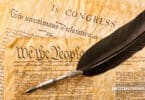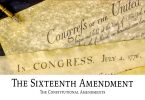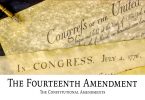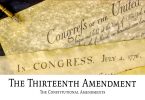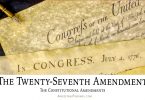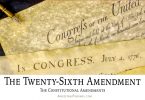The fifteenth amendment to the US Constitution is the third of the three so-called Civil War (or Reconstruction) amendments. It prohibits the federal government, as well as the individual governments of all of the states, from denying any US citizen the right to vote based on that person’s race, color, or previous condition of servitude. Essentially, it granted African American men the right to vote (as women of any ethnicity had not yet been granted the right to vote, and would not until 1920). It was ratified to the Constitution in February of 1870.
What Does it Say?
Section 1. The right of citizens of the United States to vote shall not be denied or abridged by the United States or by any State on account of race, color, or previous condition of servitude.
Section 2. The Congress shall have power to enforce this article by appropriate legislation.
What Does it Mean?
As the Civil War was wrapping up, and in the Reconstruction years that followed it, the US Congress did a lot of debating on what the rights of the former slaves they had freed (with the thirteenth amendment) would be. This was an important question, as these newly freed slaves numbered in the millions of people. Amendments were ratified to the Constitution freeing them and giving them citizenship and equal protection under the law. Some saw these measures as enough, and a voting amendment with sweeping rights given for enfranchisement was rejected by Congress in 1869.
Yet, Republicans wanted a voting amendment in the Constitution, because the previous presidential election, in 1868, where Ulysses S. Grant was elected US President, had convinced most of them that allowing the former slaves to vote was important to the strength and even survival of the Republican Party in the future. So, they proposed a more modest voting amendment, which was accepted by the other members of Congress.
While the amendment was ratified—after much arguing and resistance, especially among the southern states—the US Supreme Court took a variety of approaches to interpreting this amendment over the next century. As an example, while the fifteenth amendment prohibited the states from refusing African American men the right to vote, many southern states passed laws or made additions to their own state constitutions that put barriers in front of voter registration.
These barriers did not outright prohibit African Americans from registering to vote, but they did make it more challenging for them to register, and to exercise their right to vote if they did manage to get registered. The US Supreme Court generally upheld these laws as Constitutional, as they did not prohibit African Americans from voting.
Some of the laws that states passed to make it more challenging for African Americans (and poor white people) to vote included literacy tests, poll taxes, and white primaries (which were upheld as Constitutional, because the Supreme Court ruled that the political parties that had the primaries were private groups, and they could choose who could vote in their primary elections—as long as no one was kept from voting in the general election, the white primaries were accepted to be fine).
These state laws were declared unconstitutional later in the twentieth century. A whole new amendment (the twenty-fourth) was even enacted to prohibit poll taxes in federal elections). The Voting Rights Act of 1965 added federal oversight of elections in districts that were historically discriminatory to African American voters. Legal remedies were established for those who were victims of voter discrimination. Poll taxes in state elections were ruled unconstitutional under the fourteenth amendment in the 1966 case, Harper vs. Virginia State Board of Elections.

